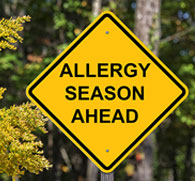How Your Michigan HVAC System can Help Alleviate Allergies in 2019

The main function of your HVAC system is creature comfort. We’ve already talked at length about how your HVAC can aid in maintaining employee morale. One less considered aspect of this vital business system is how it helps reduce allergies and filters out allergens. Allergens can be a nightmare—Itchy, watery eyes, congestion, and coughing can make your employees miserable all day. But while you’re likely to blame pollen and other allergens outdoors, your HVAC system could be responsible for the symptoms.
Today we’ll take a look how your HVAC system can keep you and your employees healthy and productive.
HVAC systems control humidity
In addition to air purification, it’s important to maintain ideal humidity levels in order to alleviate allergies. Humidity can be a major trigger for many asthma sufferers. If any of your employees have this common condition, they may be particularly sensitive to changes in humidity. In addition to your HVAC, a dehumidifier or humidifier depending on your building can help to create the perfect environment that’s safe and healthy for everyone.
Allergens can be minimized
Few workplaces are going to be perfectly clean a hundred percent of the time. As much as it would be ideal to be able to seal off your office from the smog and dirt of the outside air, the fact of the matter is that you are going to have to have a way to clean the air inside your workplace. Small amounts of allergens are rarely an issue—it’s when these build up and become a chronic workplace issue that productivity suffers. Once again, your HVAC system is your main line of defense: a good HVAC will be able to filter out allergens and toxins before they become a major problem. For the best allergy-fighting results, make sure that your air conditioner’s filter is changed on a regular basis.
New technology can make it even more efficient
Controlling humidity levels and trapping allergens give you a good start. However, what if you could kill bacteria, mold, and other allergy triggers before they have a chance to spread throughout the workplace? UV lamps, when used in conjunction with your HVAC system, sterilize both the system’s coil and the air, killing mold and bacteria. While it’s a fairly expensive technology to implement, UV lighting is perfect for buildings that have been dealing with poor indoor air quality.
Additionally, you may want to upgrade to high efficiency or HEPA filters depending on your budget and your workplace. MERV ratings from 14 to 20 will filter out almost all particulate matter, but come with one caveat: these filters can be so efficient that your HVAC system ends up requiring more energy to power the fan that gets air circulating.
One key towards all of these is that your HVAC needs regular maintenance for it to work properly in controlling allergens. A system with mold growing in it is just as bad or worse than one that doesn’t filter anything. If you can’t afford any system upgrades or add-ons, regular HVAC maintenance is one of the best ways you can ease asthma and allergy symptoms. This should include having your air filters changed and the ductwork cleaned in order to improve airflow and keep the system running efficiently.
We at Level One HVAC are experts in both installing and maintaining your HVAC systems. We’re ready to respond to all your HVAC system needs. Give us a call at (248) 486-6500 if you’d like to know more. If you don’t have time to call, you can fill in our online contact form and someone from our staff will be in touch with you shortly.
Visit our social media accounts for more information: Facebook Fan Page / Twitter Feed / Google+ Account / LinkedIn Company Page
- 25+ Years in Business
- 100% Satisfaction Guarantee
- High Performance Service Agreements
- Licensed, Insured, and Certified

